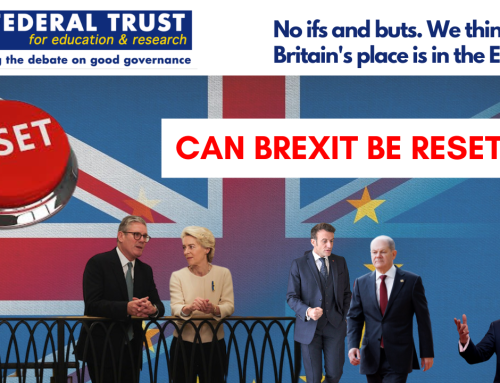EU Leaders’ video conference on COVID-19, 26th March 2020. Photo credit: Council of the European Union

by David Gow
Editor of Sceptical.scot, Senior Adviser at Social Europe and Senior Adviser at Acumen Public Affairs. He is former European Business Editor of The Guardian and worked for The Scotsman and London Weekend Television.
15th April 2020
“Forged in crisis.” “We’ll muddle through and emerge strengthened; we always do.” The same tired old clichés about the European Project thriving under stress are being rehearsed but with less conviction this time. One does not have to be the most ardent Brexiteer to believe that the Covid-19 pandemic and associated economic emergency pose an existential threat to the European Union. Or a died-in-the-wool Europhile to think the EU can survive à vingt-sept.
The EU’s initial failure to act collectively, and with sufficient mutual solidarity, when the pandemic struck home, especially in Italy and then Spain, has been well documented. Trucks laden with personal protective equipment and bearing Russian insignia snapped outside the Coliseum rubbed salt in that gaping wound, especially when contrasted with the “frugal” stance of the selfish Dutch. The fantasy of the federal super-state was again laid bare: l’empire Bruxellois was naked.
Arguably, that failure was exacerbated by the EU’s lack of competence when it comes to public health and, indeed, that argument was made. But, as we have seen in the last ten days, it was deepened by the Eurogroup’s initial inability to agree on a package of measures to mitigate the pandemic’s economic damage and the 19-strong eurozone’s uneven preparedness to weather the second major tornado to hit it in a decade or so. Even the European Central Bank’s €750 billion PEPP bond-buying programme looked second-rate compared with its 2012 Draghi Bazooka.
Perhaps more to the point, getting the 19 finance ministers in the Eurogroup to agree upon a three-pronged package at the second attempt hardly augurs well for the real storms ahead: the hit to GDP that could be as much as 25-30% in some EU countries, the surge in mass unemployment, the collapse of great swaths of business, savage poverty and, with the chasmic inequality, potential social unrest on a scale unseen in a century. The package is, as economist Adam Tooze understated it in Social Europe recently, “modest in scope.”
Mutual aid
The aftermath of the crisis will require a FDR-style New Deal going way beyond the Green (Industrial) New Deal adumbrated so far. Some of the admittedly sketchy outlines can be seen already: removing some of the straitjacket rigidity of the Stability & Growth Pact as regards budget deficits and debt – hardly surprising given that double digit deficits and huge debt increases in many member states are inevitable with the scale of raised public spending already in place alone. And returning to the status quo ante of the Maastricht criteria should be ruled out.
Equally welcome is the proposed loosening of competition rules (paywall) to ward off Chinese state-owned predators buying up (stricken) European enterprises. Now it may become more of a question in future of enabling member states to invest in and/or take over companies at the cutting edge of the digital transformation or greening of industry. Or creating them in line with the Altmaier/Le Maire proposals. The rebooted Franco-German tandem working to ensure the Eurogroup reached a deal is a step in the right direction.
But the EU/eurozone will simply have to return to so-called corona bonds – or any other nomenclature for mutualising debt. This idea has been around for at least a decade in various shapes and forms but was effectively killed off by the Germans in 2010 and has remained in a kind of half-life given the opposition of Berlin and the so-called New Hanseatic League. But the latter is suddenly losing its solidity as Ireland quits along with the Baltics.
What’s more, the mood has shifted in Germany and not just because Olaf Scholz at the federal finance ministry is more amenable. More people, including from ‘ordo-liberal’ think tanks, are joining those economists associated with the social democrats (SPD) in urging the adoption of collective debt issuance – or risk a second and even more profound eurozone crisis. It’s too early to say whether this is an idea whose time has (belatedly) come but adherence to Presbyterian views on ‘moral hazard’ (like that of Wopke Hoestra, the Dutch finance minister) is ludicrous in the face of this emergency and suggests a blinkered self-regard or more. As the Financial Times said in a recent editorial (paywall), the latest in its conversion to New Keynesianism: “Restoring employment, reviving stricken sectors and keeping public debts at manageable levels may prove to be beyond the power of certain governments without mutual support.”
End of globalisation?
Brexiteers won their “Battle against Europe” by hyping up “taking back control” and “national independence/sovereignty/freedom” and have, at times, entertained the fond illusion they were/are the avant-garde of a pan-European movement. It’s certainly true that the Covid-19 pandemic has reawakened feelings of national belonging in times of crisis. Italy certainly felt very alone and anti-EU sentiment soared last month. At the same time, various measures undertaken by nation state governments to protect their people and economies have suggested full-blown globalisation as we have witnessed it in the last, say, 25 years may be over.
What’s more, in Europe this evolution is occurring after a post-financial crisis decade that has witnessed unacceptably high levels of austerity and related poverty/inequality upon millions of citizens. The rise of the nativist Far Right has been one consequence while another has been the EU’s distressing failure to reach even a modicum of effective solidarity when it comes to handling the refugee crisis.
This has now been compounded by the closure of borders, not only in countries refusing to share the burden of the refugee crisis such as Hungary but in significant parts of the Schengen passport-free zone. By the wilful adoption by Hungary and Poland of illiberal, autocratic legislation that calls into question their right to EU membership – with relative impunity so far. And, globally, by ratcheting up trade war with bitter evocations of the nationalist, beggar-thy-neighbour consequences that brought the Great Depression and World War in the 1930s…
And of the EU?
Inevitably, the world post-pandemic will look very different from where we were just a few months ago. Virtually unbridled globalisation and its exploitation by the likes of tax-shy Big Tech will no doubt be mitigated or even tamed. But the crisis has NOT dealt the mortal blow to supra-national bodies such as the EU that, as veteran French foreign policy wonk François Heisbourg put it, can strengthen if it uses its scale to promote solidarity, mutual aid and the like. “The Zeitgeist, according to which this crisis is putting the national ahead of the EU dimension, is wrong-headed,” he said.
Au contraire. The pandemic and the magnitude of its knock-on effects have heightened the case for shared knowledge and collective action. This can mean, in the immediate, the co-ordination of measures to exit the lockdown as Commission President von der Leyen urged on April 15. Or to scale up investment in vaccine research without over-promising. But they go far transcend these. The SGP’s escape clause has been activated but the entire structure of centralised imposition of austerity via the European Semester and the like needs to be rethought, with a genuine emphasis this time on alleviating poverty and inequality. Some form of shared recovery bond or fund to help strengthen healthcare systems and ensure that weaker economies – especially Italy which faces debt of over 150% of GDP – are not put to the sword as in 2010 onwards.
The present crisis and prolonged aftermath underline the case for co-ordinated measures to combat the climate emergency, with the EU leading the way at COP-26 whenever that can be convened in Glasgow, and to aid economic development in Africa and, closer to home, in the Eastern Neighbourhood. The long-promised digital transformation equally requires collective action to tame the surveillance powers of offshore Big Tech – and investment to build European capability. And, as President Trump repeatedly exposed during the pandemic, Europe can no longer depend on American protection.
There remains, of course, a serious risk that member states will revert to nationalist self-protection or, worse, lapse into nativist revanchism but the sheer scale of the tasks that face Europe in the second half of this year and next will require huge amounts of co-operation in a way that’s true to the EU’s core values. And the adoption and promotion of new policies and measures that enable half a billion people or more to enjoy a much safer, shared future.






